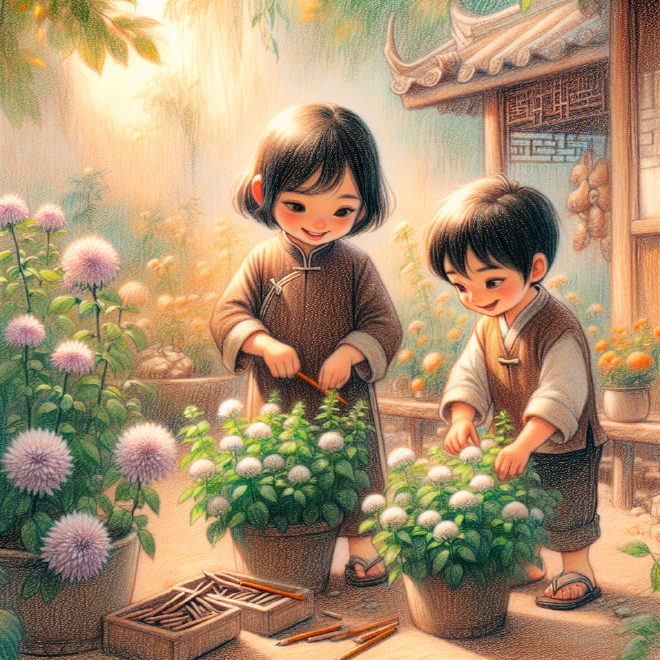猫咪的秘密花园

Table of Contents
Audio #
汉字 #
丽丽和小明是好朋友。他们都喜欢花草。有一天,他们决定一起去拜访一位有名的中医。
这位中医是一位老爷爷,他住在安静的山上。他的房子周围种满了各种各样的草药。
“欢迎,欢迎!你们想了解什么草药呢?” 老爷爷笑着问。
丽丽说:“我们想知道哪些草药可以帮助我们保持健康。”
老爷爷带他们参观了他的药园。他指着一棵绿色的植物说:“这是薄荷,可以用来泡茶,能让人感到清爽。” 他又指着另一棵开着小黄花的植物说:“这是菊花,可以明目。”
小明问:“这些草药容易种吗?”
老爷爷说:“不太难,只要有阳光和水,它们就能生长。”
丽丽和小明听了很高兴。他们回到家,决定在自己的小花园里种一些草药。他们种了薄荷和菊花,每天都认真地照顾它们。
几个月后,他们的草药长大了。他们用自己种的薄荷泡茶,觉得特别好喝。他们的花园也变得更漂亮了。他们很高兴能学到新的知识,并且拥有了一个充满生机的小花园。
Pinyin #
Lìlì hé Xiǎomíng shì hǎo péngyǒu. Tāmen dōu xǐhuan huācǎo. Yǒu yītiān, tāmen juédìng yīqǐ qù bàifǎng yī wèi yǒumíng de zhōngyī.
Zhè wèi zhōngyī shì yī wèi lǎo yéye, tā zhù zài ānjìng de shānshàng. Tā de fángzi zhōuwéi zhòng mǎnle gè zhǒng gè yàng de cǎoyào.
“Huānyíng, huānyíng! Nǐmen xiǎng liǎojiě shénme cǎoyào ne?” Lǎo yéye xiàozhe wèn.
Lìlì shuō: “Wǒmen xiǎng zhīdào nǎxiē cǎoyào kěyǐ bāngzhù wǒmen bǎochí jiànkāng.”
Lǎo yéye dài tāmen cānguānle tā de yàoyuán. Tā zhǐzhe yī kē lǜsè de zhíwù shuō: “Zhè shì bòhé, kěyǐ yòng lái pào chá, néng ràng rén gǎndào qīngshuǎng.” Tā yòu zhǐzhe lìng yī kē kāizhe xiǎo huánghuā de zhíwù shuō: “Zhè shì júhuā, kěyǐ míngmù.”
Xiǎomíng wèn: “Zhèxiē cǎoyào róngyì zhòng ma?”
Lǎo yéye shuō: “Bù tài nán, zhǐyào yǒu yángguāng hé shuǐ, tāmen jiù néng shēngzhǎng.”
Lìlì hé Xiǎomíng tīngle hěn gāoxìng. Tāmen huídào jiā, juédìng zài zìjǐ de xiǎo huāyuán lǐ zhòng yīxiē cǎoyào. Tāmen zhòngle bòhé hé júhuā, měitiān dōu rènzhēn de zhàogù tāmen.
Jǐ ge yuè hòu, tāmen de cǎoyào zhǎng dàle. Tāmen yòng zìjǐ zhòng de bòhé pào chá, juéde tèbié hǎohē. Tāmen de huāyuán yě biàn dé gèng piàoliangle. Tāmen hěn gāoxìng néng xué dào xīn de zhīshì, bìngqiě yǒngyǒu le yī ge chōngmǎn shēngjī de xiǎo huāyuán.
English Translation #
Lili and Xiaoming are good friends. They both like flowers and plants. One day, they decided to visit a famous traditional Chinese medicine doctor together.
This TCM doctor was an old grandpa, and he lived on a quiet mountain. His house was surrounded by all kinds of herbs.
“Welcome, welcome! What herbs would you like to learn about?” the old grandpa asked with a smile.
Lili said, “We want to know which herbs can help us stay healthy.”
The old grandpa took them to visit his herb garden. He pointed to a green plant and said, “This is mint, which can be used to make tea and can make people feel refreshed.” He pointed to another plant with small yellow flowers and said, “This is chrysanthemum, which can brighten the eyes.”
Xiaoming asked, “Are these herbs easy to grow?”
The old grandpa said, “Not too difficult, as long as there is sunshine and water, they can grow.”
Lili and Xiaoming were very happy to hear this. They returned home and decided to plant some herbs in their own small garden. They planted mint and chrysanthemum, and they took care of them carefully every day.
A few months later, their herbs grew up. They used the mint they grew to make tea, and it tasted especially good. Their garden also became more beautiful. They were very happy to learn new knowledge and have a small garden full of vitality.
Grammatical Points and Analysis #
Verb-Object Phrases: #
- 拜访中医 (bàifǎng zhōngyī): to visit a TCM doctor
- 了解草药 (liǎojiě cǎoyào): to understand herbs
- 保持健康 (bǎochí jiànkāng): to maintain health
- 参观药园 (cānguān yàoyuán): to visit the herb garden
- 泡茶 (pào chá): to make tea
- 种草药 (zhòng cǎoyào): to plant herbs
- 照顾它们 (zhàogù tāmen): to take care of them
- 学到知识 (xué dào zhīshì): to learn knowledge
Resultative Complements: #
- 种满 (zhòng mǎn): planted full (种: to plant, 满: full)
- 长大 (zhǎng dà): to grow up (长: to grow, 大: big)
- 变得漂亮 (biàn dé piàoliang): becomes beautiful (变得: to become, 漂亮: beautiful)
Use of “只要…就…” (zhǐyào… jiù…): #
- “只要有阳光和水,它们就能生长” (zhǐyào yǒu yángguāng hé shuǐ, tāmen jiù néng shēngzhǎng): “As long as there is sunshine and water, they can grow.”
Use of “越来越…” (yuè lái yuè…): #
- In the story, although not explicitly used, you could say “他们的花园越来越漂亮” (tāmen de huāyuán yuè lái yuè piàoliang): “Their garden is getting more and more beautiful.” This is a common structure to express something becoming more and more of something.
Questions #
Question 1:
中文: 老爷爷告诉丽丽和小明, 菊花有什么用? Pinyin: Lǎo yéye gàosù Lìlì hé Xiǎomíng, júhuā yǒu shénme yòng? English: What did the old grandpa tell Lili and Xiaoming about the use of chrysanthemum?
Click to show the answer
answer #
中文: 老爷爷说,菊花可以明目。 Pinyin: Lǎo yéye shuō, júhuā kěyǐ míngmù. English: The old grandpa said that chrysanthemum can brighten the eyes.
Question 2:
中文: 丽丽和小明在他们的花园里种了什么草药? Pinyin: Lìlì hé Xiǎomíng zài tāmen de huāyuán lǐ zhòngle shénme cǎoyào? English: What herbs did Lili and Xiaoming plant in their garden?
Click to show the answer
answer #
中文: 丽丽和小明在他们的花园里种了薄荷和菊花。 Pinyin: Lìlì hé Xiǎomíng zài tāmen de huāyuán lǐ zhòngle bòhé hé júhuā. English: Lili and Xiaoming planted mint and chrysanthemum in their garden.
Disclaimer: This story is purely fictional and generated by AI. Any similarities to real people, places, or events are purely coincidental.